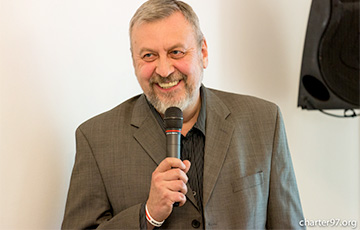Today, Belarus Matters
9- Andrei Sannikov, The Daily Beast
- 9.10.2015, 15:33
- 10,005

The result, predicted by bookmakers, has come as a shock.
The result predicted by bookmakers came as a shock. A Belarusian writer, Svetlana Alexievich, has won the Nobel Prize for Literature. But it was a shock in a positive sense since I forbade myself to think about the result, announced today, wholeheartedly hoping that Svetlana would win but remaining very skeptical that I’d get my wish.
I was skeptical because, as a former candidate for president of Belarus, who went through torture and imprisonment by the Lukashenko dictatorship, I’ve heard time and again from politicians and intellectuals: “We understand your problems, your suffering, and your tragedy, but there are more important things than Belarus on our agenda.”
Today, there is no more important thing than Belarus, as my countrywoman and friend is awarded the highest honor for literature. It gives me hope that those who were preoccupied elsewhere will pay attention to Belarus in a different way.
Svetlana’s books are not easy reading. She writes about women in war and manmade tragedies such as the Chernobyl nuclear disaster; about lives crippled from the Soviet invasion of Afghanistan (hello, Russia in Syria); about the changes undergone by those who suffered the demise of the USSR but not necessarily the collapse of the “Evil Empire.” She is also not shy to face the most difficult issue of what is happening with us and to us. If she cannot offer her view on the problem directly, she has the good sense to say so.
I asked her a question about her latest book, Second-Hand Time, the subtitle of which is “The Demise of the Red (Wo)man.” Who did Svetlana think would come after this Red Being? Her answer was honest, as usual. “A man after a very serious illness, and I don’t know if we can blame him/her,” she told me. “It’s some vulgar period [we’re living through now]. The post-Soviet person wants to try different foods, go to Egypt on vacation… He’s living in a material world, which was banned and unavailable before. I was always struck by the fact that when you travel abroad and go through Lithuania, for example, and you stop and start talking with the locals, they immediately talk about politics, freedom, intellectual things. When you go through our countryside, they always tell you: ‘What freedom? There is enough sausage and vodka.’ And they look at you as at extraterrestrial. But I always say to my friends: ‘Don’t be desperate. We have to work a lot and have a lot of explaining to do.’”
Her reporting requires a lot of courage since Svetlana also acts as a conduit for the emotions of others. These are not always (or often) pleasant emotions or always pleasant people, given the experiences they’ve had. Yet she represents her subjects well while keeping her own self intact. Whether you like her style or not, you have to listen to her. She is a powerful speaker and a fascinating interlocutor, one capable of being both metaphorical and precise. This even comes through in the titles of her books, like Second-Hand Time.
Svetlana could have become a great investigative reporter, such is her ability for drawing out a source and getting him to say things he might not otherwise say. When you talk to her she can interrupt you in a manner that at first seems insignificant but which then forces you to take the conversation in a direction she wants you to go.
I’m really happy today and very proud for my friend—for literary, national and personal reasons. Some time ago, Svetlana read my own forthcoming book, liked it and even offered to write a foreword to it. It’s called My Story: Belarusian Amerikanka, or the Election under Dictatorship. (Amerikanka is the name of the most feared KGB prison in Belarus). She encouraged me to continue writing when I wasn’t sure I could.
I’m really grateful to the Nobel Prize Committee for awarding Svetlana Alexievich because they gave the right perspective to what is happening in Belarus today. A dictator who has been in power for 21 years is re-electing himself in three days time with the help of Potemkin theatre he’s put on for the West, billing himself as a useful ally against Vladimir Putin, in order to lift sanctions and preserve his regime. Amid all the repression, hypocrisy, and meanness that the Belarusians are put through, all of a sudden we hear the voice from outside which says with authority: “We are with you. You are not forgotten. There are values in the world. And you have Svetlana”.
Andrei Sannikov, The Daily Beast








